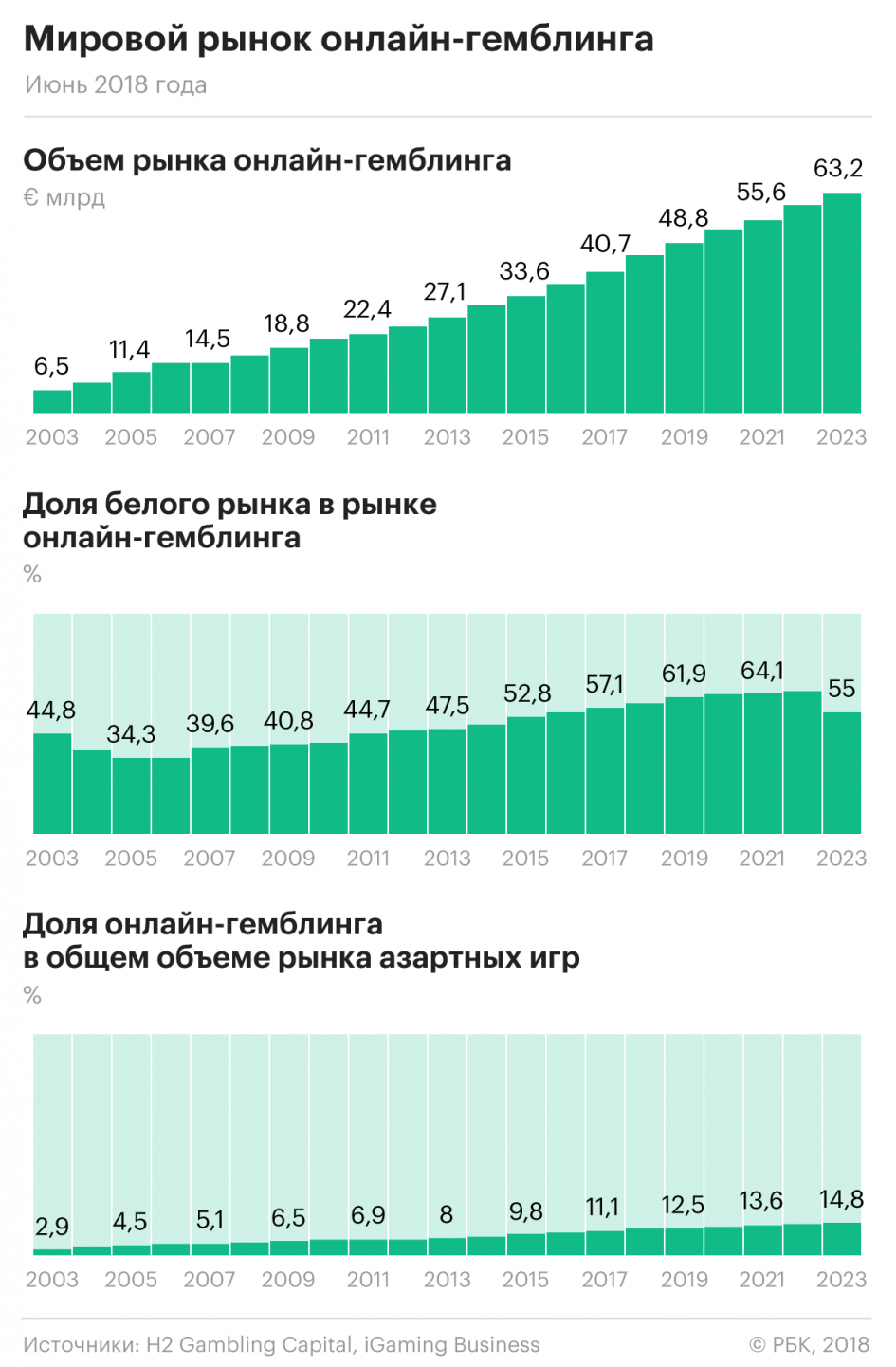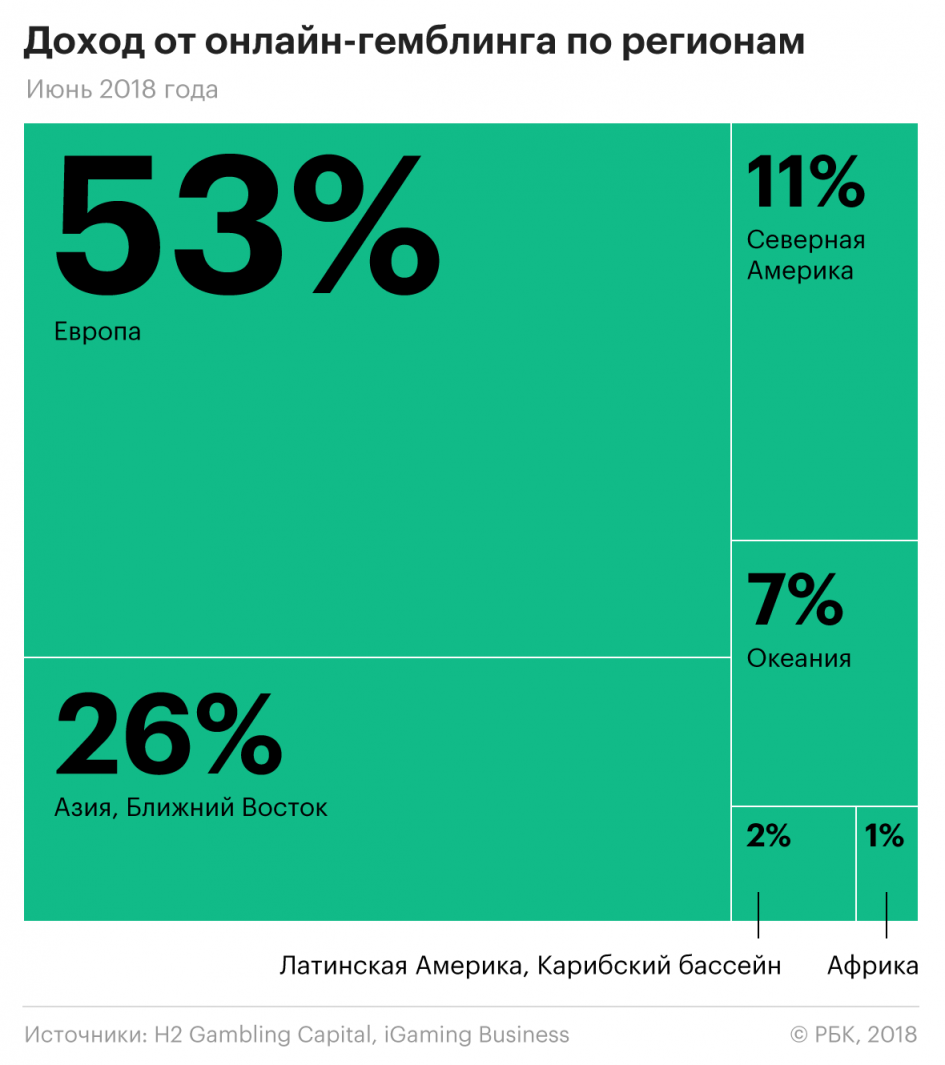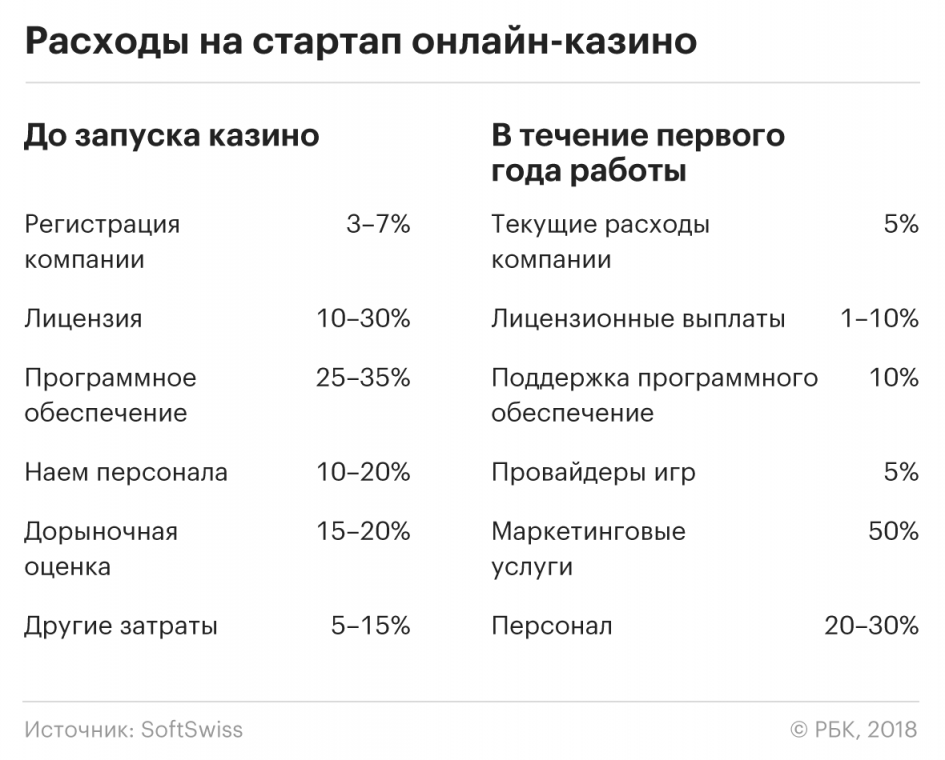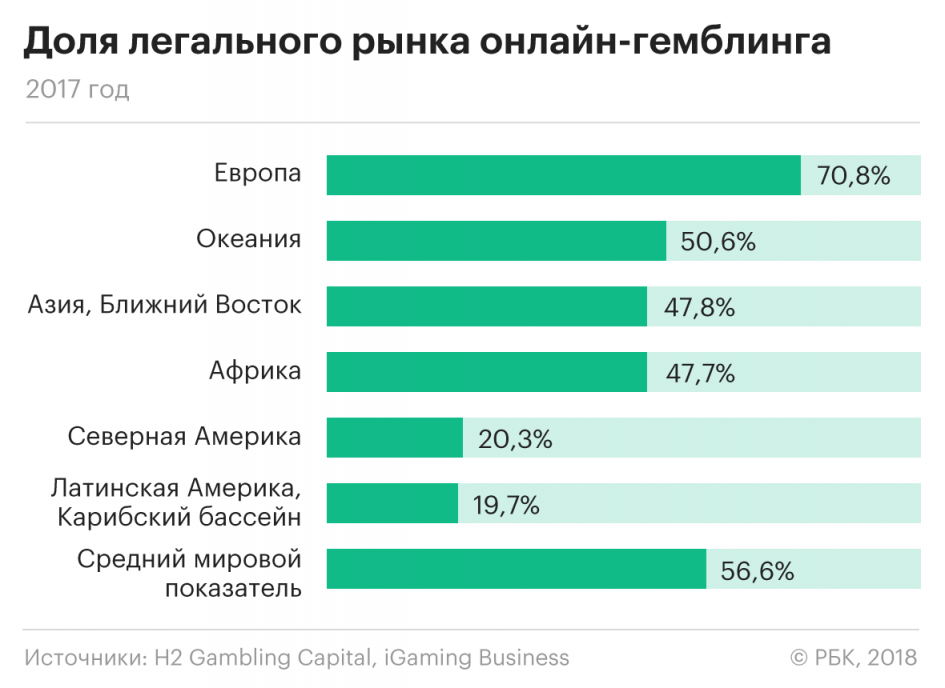Online casinos are banned in runet, but this does not prevent domestic entrepreneurs from investing in the gambling industry. “RBC.Industry” tells how the global online casino market, which is projected to grow this year to $ 45 billion.
Countdown to the history of online casinos dating back to 1994, when the company Microgaming has developed the first platform for online gambling. Microgaming and now remains the largest developer of software for online casinos around the world.
Online casinos in Russia were legal for a short time: from the early 2000s to 2009, when the law banning gambling in the whole territory of the country came into force, except for four zones – in Kaliningrad region and in Altai, Krasnodar and Primorsky territories.
Despite the ban, dozens of companies, engaged in online gambling, operate in Russia. Russian laws forbid to organize online casino in Runet, but allow to create its software or to run licensed casino for players from other countries. The sites of legal casinos cannot be accessed from the IP addresses of the countries where gambling is prohibited. Among them are Russian, Canadian and Japanese IPs.
The share of such white business today is about 60% of the world market of more than €45 billion (11.9% of the total gambling market). Each year the market for online gambling is growing by 10-15%, the market for mobile gambling is 20%, said Ivan Montik, founder of SoftSwiss (producer of software for gambling).

Thanks to such dynamic indicators, more and more Russian investors are turning their attention to this industry. But not all are making the profit they had hoped for. Managing an online casino in terms of business processes is similar to managing any other e-commerce companies – such as, for example, online stores – and has its own specifics and pitfalls.

“You should not expect to invest €100 thousand in the launch of an online casino and you will be clipping coupons. This business is not easier than any other: you need to understand it, know the nuances, build a competent company,” says Grigory Shelest, business director of Boss Gaming studio (manufacturer of online casinos turnkey).
Ivan Montik, founder and head of Soft Swiss:
“A year ago I talked a German developer out of opening an online casino. From what his friends told him, he realized that gambling was a profitable business, so he started consulting. Companies were offering their services. I explained to him that it would not be possible to invest and forget about the project.
Players would not come to the site by themselves. In addition, they can win and withdraw a large sum. And the casino will be obliged to pay it. For example, one of our operators had a case with the winning of €1 million at the stake of €50. By the way, Russian investors often want to invest in the gambling, not knowing the market. But it is not a good idea to breed miserable operators, so personally I first try to explain what awaits them”.
Online casinos are rarely the only and main project for an investor. More often it is invested in it to diversify the business: for example, to engage in it in parallel with betting (from English “betting”).
Also online casinos are often of interest to entrepreneurs from the IT-industry, businessmen who are already more or less familiar with the cryptocurrency market, and the owners of any e-commerce projects.
In recent years, at least 20 Russian companies have invested in online casinos, say players in this market. Total in the world is working, according to various estimates, from 2,000 to 3,000 legal online casinos. Their investors do not violate any laws, but prefer to stay in the shadows.
“Gambling is a very closed, confidential business. With clients we sign an NDA (non-disclosure agreement, a non-disclosure agreement. – “RBC.Industry”). Even at an interview, a candidate may say, “I worked on a project, but I won’t say which one. So we do not disclose the names of client companies,” says Irina Korchagina, head of marketing at Boss Gaming studio.
Stage 1. Costs: about €50 thousand.
A startup starts with the organization of the back office. It manages the casino, collects statistics and reports, controls financial transactions. At this stage they develop the design and CMS – the “engine”, the platform for the site with slots and payment system.
Also at this stage, an affiliate program is created to attract players to online casinos. It registers affiliates (affiliate, the one who attracts new players in gambling) – administrators portals, planning to advertise casinos. They place banners and casino videos. The affiliate program assigns tracking codes and referral links to users who have seen these ads and come to the casino.
Affiliate sees in his profile on the site of the affiliate program, how many players he brought to the casino and how much he earned on them. His income is formed on one of two schemes: either on the principle of revenue share – 20-50% (most often 30%) of the players’ losses, or on the scheme cost-per-action – payment for a specific action, such as registering a player to make a deposit or for watching movies with embedded casino commercials.
Stage 2. Costs: from €35,000 to €300,000 + deposit from €5,000.
At the initial stage, you need to obtain a license or sublicense, which is also a white label, when the project operates under its own brand on the platform of the license holder. Running a white label is cheaper – €35-45 thousand with monthly payments of 10-30% of the project profitability.
Starting with your own license will cost €60-300 thousand, depending on the jurisdiction: there are a dozen countries in the world that issue such licenses. The least reliable license on the market is considered to be that of Curacao and Costa Rica, more reliable – that of Malta and Gibraltar.
The final payment is a deposit on the licensee’s account from €5,000 to €25,000 for turnover. “The purpose of the license is to guarantee to the player that if he wins, he will receive a payout. In addition, the license guarantees that the casino uses slots official software manufacturers, which give exactly a random result. Checking for a license is easy: at the bottom of the casino website should be the emblem of the jurisdiction of the license. When you click on it opens the public register”, – explains Gregory Shelest, Business Director of Boss Gaming studio.
Maria Lepshchikova, founder of the legal company “Legal Line” (specializes in legal regulation of gambling): “Costa Rican license is funny because it allows gambling activities all over the world, except for the territory of Costa Rica itself. However, in many countries, including Russia, these licenses are not quoted anyway”.
Vadim Potapenko, Head of Sales at Slotegrator (gambling software provider): “We work on the international market with projects that cover many regions – Africa, Latin America, Europe, the CIS countries – all where operation under a license is allowed. For example, the Curacao license prohibits work only in four countries. Its obtaining costs €20-25 thousand. In general, investment in the launch of online casinos start from €50 thousand and may reach up to €1 million to create your own product.

Online casino projects rarely run on just one country, so the gambling industry is considered one of the most global and international. Casinos tend to focus on one region, such as Scandinavia, South Africa or the CIS countries.
Irina Korchagina, head of marketing at Boss Gaming studio:
“Marketing depends on the country to which the online casino is oriented. For example, CIS is the style of Azino777, JoyCasino, Vulkan – marginal subculture. You will not enter the European market with such a product. In Scandinavia, a simple design in pastel colors and characters personifying the casino are popular.
It is not possible to play in this casino from Russia. Even if the user includes a VPN and wins €200, you will need a Scandinavian passport details and a local credit card to withdraw. In general, you have to cheat all the time. By the way, the Scandinavian players themselves often do not withdraw money. Someone works in the government, and he is uncomfortable to load his passport. Someone simply refers to the casino as an entertainment.
In Europe, in contrast to Russia, gambling is not perceived as a way to “raise dough. Europeans even frequently call to support-service to talk about life, and not to solve organizational questions. The average gaming deposit in Europe is €100-300. In the CIS market it is about €10. But you can take the number of players. Completely different business models”.
Players of the gambling market call Asia one of the most promising regions because of the large number of players. The final choice can be made at the annual international exhibitions and forums on gambling. The largest of them are held in London and Berlin. In the CIS, the largest conference is Russian Gaming Week in Moscow. This year it was held for the 12th time in Sokolniki and gathered dozens of participants and hundreds of guests.

The annual Moscow gambling forum proves once again that this industry is developing in Russia and legally, despite the ban on gambling in runet.
Russian laws prohibit online casinos that do not block Russian IP-addresses, i.e. are oriented on Russians. Such casinos work on gray market. Its volume in Russia is estimated at €1 billion per year. Operators of these casinos are criminally liable with imprisonment for up to six years. Advertising of gambling is also prohibited in runet. But it is already possible to post commercials on services like YouTube, as they are not Russian.
Any other work in online gambling in Russia is allowed. Many companies are already opening representative offices in Russia. For example, in St. Petersburg is the head office of the company Octavian, which is part of the holding Novomatic (one of the three largest producers of software for online casinos in the world). “Octavian develops technologies, in particular for online casinos and online games, for customers who are outside of Russia. We opened an office in St. Petersburg because there have always been many professional talented developers in this city,” the company says.
The creators of the turnkey online casino Boss Gaming Studio plan to open their own office in Moscow in addition to the three existing ones in Europe. “Russian bans do not scare us, our business is legal. We do not promote gambling in banned markets, but provide a licensed platform. This does not conflict with the gambling prohibition laws,” the company explains.
Moreover, online gambling market players are sure that gambling on the Internet will be legalized in Russia in the foreseeable future, since bans and blocking do not work anyway.
Rustam Gilfanov, co-owner of Lucky Labs (producer of games and software for online gambling): “Blocking the Internet does not work. The best example here is Telegram. I still have it working without any problems. If an Internet company has the desire to serve users, the technical possibility will always be found. China was and is the pioneer and flagship in the field of online blocking. If China does not completely disconnect from the rest of the world, then all kinds of services will work there too, if only they wanted to”.
Vadim Potapenko, Head of Sales at Slotegrator:“Online gambling is growing all over the world. It can provide a constant flow of finances at the expense of the tax system. An example of reasonable regulation is Georgia. Licensed gambling projects are allowed there and all conditions are created for the development of the industry.”
Maria Lepshchikova, founder of the legal company “Legal Line” (specializes in the legal regulation of gambling in Russia):
“Today in Russia it is easier for a company to create a ‘mirror’ than to sue over blocking. I handled such a case last autumn. By the way, it was the first case in Russia.
Previously lawsuits against blocking had never been considered on the merits. Game-roulette with bets in the form of artifacts of famous network game was sued by Federal Tax Service and Roskomnadzor. The blocking was illogical. After all, it wasn’t a cash game. The artifacts, even those tied to the player’s personal account, are part of the software of the copyright holder of the program, not the user’s property, which he is risking.
Risk is an inherent feature of any game of chance. But we lost the court. Can you imagine, the decision of the judge of the Moscow arbitration court coincided with the withdrawal of the Federal Tax Service, right down to the typos. The position of the Russian government agencies regarding gambling is the same: prohibit it as much as possible!”
Today about a third of online casinos allow betting in cryptocurrencies. Since payment systems do not work with them, the main income of online casinos continues to receive in traditional money. But “crypto” is the future of online casinos, so it is better to immediately build payment with it into their projects, many creators of gambling software believe.
SoftSwiss was the first company to create an online casino platform for bitcoin gambling in 2013. “We were a regular IT company, founded in 2008, worked with German customers, created a lot of interesting complex solutions,” says the founder of the company Ivan Montik. – In 2011, Playtech, the largest international gambling services provider, bought the Belarusian online casino software developer Viaden Media, and I thought, why not occupy this niche?
That’s how we grew from being IT people into a solution provider for online casinos. In 2012 we had eight people in our team. In 2013, we launched a platform for bitcoin gambling. Now we have more than 100 employees. We have clients from Japan, South America, South Africa, the European Union, the CIS countries – Ukraine, Belarus, Kazakhstan and Russia. The development center is in Belarus, we have offices in Austria and Malta, as well as legal advice in Curacao”.
Alexander Shakirov, marketer, “Analytics Insight” (a developer of blockchain solutions):
“The head of our company, Roman Moiseyev, founded it more than ten years ago. Initially we were engaged in IT development. A couple of years ago, blockchain technology was trending. We thought: the team has powerful experience, it can “saw” complex solutions. One of them was European online roulette on smart contracts. Ethereum supports them.
In this software, there is only a code and a player, nobody else – no people, no croupier, no additional nodes, so it is precisely a random number that is provable to fall out. For the Russian market our roulette is not a game of chance. It is just some numbers on the Internet. In the Russian legal field, there is no concept of “cryptocurrency” or “token” yet. But in other markets, for example in the United States, cryptocurrency already falls under the definition of securities, so now we are drawing up a license for this product”.
Cryptocurrencies and online gambling are so closely related because they are similar in nature – attracting gamblers, gambling market players note. In 2017, the wave of interest in “crypto” has also increased the flow of players on casino sites. Many businessmen are diversifying their business in view of the new trends.
The first Russian online casino, Chance.ru, was created by Dmitry Pavlovsky, now vice president of the bookmaker Liga Stavok. “In 2000, the Internet was gaining popularity. It was obvious that the future was behind it. I was studying at Moscow State University in the Department of Computational Mathematics and Cybernetics and was moonlighting at a company that developed websites,” he recalls. – To run a casino on the Internet, it was enough to get a license from the State Sports Committee for gambling. I doubted that someone would pay with a credit card for a virtual ball, because back then not even everyone knew what email was. But the order paid well, so I developed the software. The author of the idea was the late Oleg Zhuravsky. He was literally energetic and could predict the future of markets that did not yet exist. Later we became business partners. Liga Stavok appeared: bookmakers began to open spacious and comfortable bookmaker’s clubs instead of dens in dark basements”.
In 2005 the turnover of the gambling industry in Russia amounted to $ 5-6 billion. By 2006 the State Committee for Sports issued 6.3 thousand licenses for gambling business. About 60% of Russian gambling clubs were in Moscow and St. Petersburg. But in 2006, the State Duma passed a law banning gambling throughout Russia, except for four special zones. All casinos, including those on the Internet, were closed by 2009. Oleg Zhuravsky, meanwhile, united a dozen colleagues in the National Association of Bookmakers. On behalf of the association he convinced the lawmakers that bookmakers operate on the principle of intellectual game, and their work does not fall under the ban.
Now betting (sports betting) in Russia is a business that, unlike online casinos, can be run completely legally. Online betting was legalized in February 2016. Today, 31 companies have a license. However, even in this market in Russia, the illegal sector, according to Dmitry Pavlovsky, takes up to 70% of the market. The volume of the market, including the illegal one, according to his forecasts, will amount to $15 billion this year against $10 billion last year.
Betting is legal in many countries where online casinos are banned. It was legalized this year in the U.S. as well. “It’s scary to think how many years there have been fighting to legalize betting, and now it’s just recently happened,” says Dmitry Pavlovsky. – Trump is a well-known businessman. This market is now the largest available (the annual volume of illegal betting in the U.S. was estimated at $150 billion – “RBC.Industry”). Only the Southeast Asian market is larger, but most companies in it operate in a gray area. In America, there have always been strict requirements for compliance with the law. People received real sentences and tens of millions of dollars in fines. But now the industry is operating legally.
According to Russian laws, the addresses of all betting clubs of a legal company fit into the license. Now online accounts for about 65% of bets. For online betting a player goes through a multistage identification system: he comes to the nearest club in person, then registers in the Interactive Payments Transfers Registration Center (IPTC). Betting is taxed according to the formula “previous winnings minus bet” in each game, although in other industries the tax occurs when you go to cash. All this does not allow the legal sector to develop quickly.
Dmitry Pavlovsky, vice president of the bookmaker’s office “Liga Stavok”:
“Russians are resourceful people. At first they came up with a way to engage in bookmaking without a license. For example, they issued settlement and forward contracts: they used the event as an underlying asset. Then they used bill of exchange schemes. The regional law enforcers, to put it bluntly, understood nothing about it and thought: “Maybe this is the right thing to do?”
Then the casinos began to operate under a betting license. The player bet on one of the 37 numbers in which the ball would fall, and the roulette payout table was called a bookmaker’s odds. And it’s hard to argue with that. Here is the regulator in the UK, faced with this, admitted that he had been cheated, and banned the installation of more than two “roulette betting points” in one bookmaker’s office.
In Russia right now there is no mimicry of gambling machines with bookmaking for another reason. The illegal business, it seems, simply sees no need for legalization.”
Betting also belongs to the gambling industry, but it should not be compared with online casinos. In the United States, the difference between online casinos and online betting is called a game of chance and a game of skill.
Author: Irina Pankratova.
Source RBC: pro.rbc.ru
I want to get the news on TELEGRAM!
Subscribe to our channel